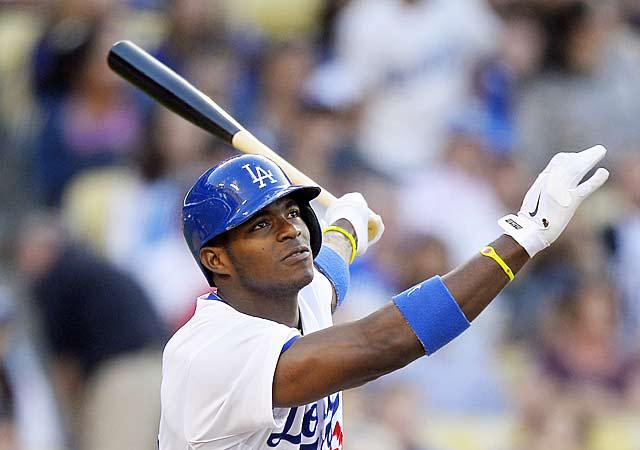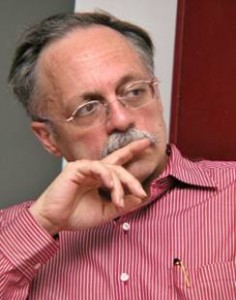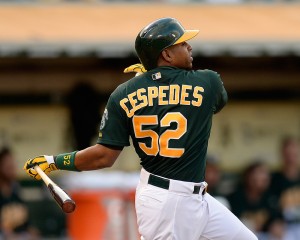
U.S. trafficking in Cuban baseball players
The shocking story of Yasiel Puig’s hazardous journey from Cuba to the Los Angeles Dodgers calls for congressional hearings to end the trafficking in Cuban athletes, carve an exemption into the U.S. economic embargo, and legalize the entry of Cuban players to compete in the major leagues without having to defect.
Major League Baseball and the U.S. government need to step up to the plate. According to Cuban-born human rights attorney Jose Pertierra:

“Congressional hearings on this topic might be a good idea. Perhaps we can open up immigration for Cuban workers, H1B visas, employment-based visas for professionals and athletes. In other words, discourage illegal immigration by permitting legal immigration by Cubans. Imagine: no need for the Cuban Adjustment Act for these guys. Baseball players from foreign countries get visas as a matter of course from MLB, but because of the blockade Cubans are ineligible to work for baseball clubs unless they defect. The reason of course is that no U.S. company may pay for services rendered by any Cuban who lives on the island. Most Americans don’t know that. They think that the Communists have the baseball players captive on that imprisoned island and that is why the ball players defect: to seek freedom.”
An exemption (HR 5426, incorporated into H.R. 4461, in effect since 2000) from the sanctions already exists for large American growers and pharmaceutical companies, netting those U.S. corporations billions in profits. A similar exemption seems necessary to protect Cuban athletes from more illegal and dangerous odysseys like Puig’s to the baseball fields of their dreams. According to the Puig revelations, published in Los Angeles Magazine and ESPN The Magazine, the young outfielder was: forced to make arrangements with suspicious go-betweens; promised one of them 20 percent of his future earnings; transported by boat to Mexico under the auspices of the Los Zetas cartel; kept in a dingy one-room apartment; threatened with bodily harm unless ransom money was not forwarded; and finally entered the U.S. by undisclosed means. Puig was not successful until his fifth effort at illegal immigration.
Officials from the Baltimore Orioles and Los Angeles Dodgers speak favorably of an exemption from the U.S. embargo for players like Puig, but say they need clarifications from the Cuban and U.S. governments.
On the Cuban side, where baseball is a national religion, the Cuban government long has prized its excellence in amateur sports as a gift of the Revolution. Cuban teams have won numerous Gold and Silver Olympic medals as “standard bearers of revolution.” But they make less than one percent than the salaries possible in the MLB if they defect. Twenty-one Cubans now play in the MLB, including some of the game’s rising stars. Additionally, MLB games are broadcast on Cuban television. Gradually the Raul Castro government is amending the longtime Cuban policy. The new demand of the Cubans is that their players have a right to compete at the highest level without having to forsake their citizenship or participation on Cuba’s heralded national team.
The Cuban government has lifted its ceiling on Cuban players’ salaries and now allows their experienced athletes the right to sign for foreign teams without having to defect. After signing contracts with, for example, the Dodgers, the Cuban Baseball Federation would tax their salaries from anywhere between ten and thirty percent. The same players would be eligible to play with the Cuban national team during winters, as well as international competitions. They could come, go, and retire in Cuba if they chose.
Just this week, 34-year-old Frederich Cepeda, a star Cuban outfielder, signed a $1.5 million contract with Japan’s Yomiuri Giants under which he is allowed to keep 80 percent of his earnings. Cepeda hit .329 over 17 seasons and earned Olympic Gold in Athens. Cepeda could not make such a deal with an MLB team because of the embargo.
So far the MLB’s official line is to follow US foreign policy, which forces the baseball owners into tacit or shadowy participation in trafficking, smuggling, questionable payoffs, or whatever labels come to mind. Under a rational policy, the MLB would be able to:
- Invest money and equipment in Cuban baseball;
- send scouts, instead of spies, to observe Cuban players;
- offer U.S. dollars to Cuban prospects; and,
- return to the days when Tommy Lasorda pitched in Havana.
What prevents this exercise in rationality? By all accounts, it’s the embargo. If the American people knew the achievements of Cuba in baseball, and other sports, they might become sympathetic to Cuba’s youth and social programs. They might ask why there’s an embargo at all. It’s better propaganda for the State Department to depict Cuban players as heroic refugees from Communist tyranny, running from concentration camps, where they somehow learned to play ball. The press coverage about Puig defines him as “escaping” the island. Maybe so, but one rarely hears of Salvador or Mexican immigrants as “escapees,” which is because they come to the U.S. for economic reasons, send remittances home, and travel back and forth for family reasons.
Since the last season, several new Cuban players have been the stars of the major leagues. Consider:

- Jose Fernandez of the Miami Marlins, along with Puig, finished first and second in the rookie-of-the-year competition last season;
- Aroldis Chapman, known as the Cuban Missile, of the Cincinnati Reds, throws faster than any pitcher in history, up to 105 mph;
- Yoenis Cespedes, of the Oakland A’s, won the 2013 Home Run Derby;
- Jose Abreu, holder of Cuba’s home run record, signed with the Chicago White Sox this year.

“Major league baseball has stolen our talent,” argues Pedro Cabrera Isidron of the Cuban Olympics Committee, who wants bilateral negotiations. “They’re encouraging players to abandon our country in an illegal way. The way they channel people to the U.S. via third countries like the Dominican Republic is just like human trafficking. The U.S. government and the major league authorities see this and they just cross their arms.”
It’s conceivable that the MLB could make this a “Jackie Robinson moment” by embracing the cause of these Cuban players and demanding hearings toward a more rational policy than the embargo. Creating a level playing field for the players might spark public interest in a level playing field for the two countries.
Tom Hayden is a former California State Senator and leader of sixties peace, justice and environmental movement. He is the director of the Peace and Justice Resource Center.
(From the Huffington Post)

